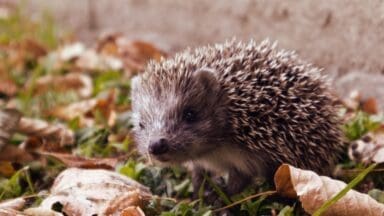
The extreme temperatures and prolonged dry spells are leaving hedgehogs without access to food or water, placing the vulnerable species at serious risk, according to wildlife experts.
The extreme heat has dried and hardened the ground, making it nearly impossible for hedgehogs to forage for their natural prey such as worms and beetles. This loss of access to essential food sources has led to an increase in hungry and distressed animals being seen in gardens and brought into rescue centres. The Gloucestershire based, Vale Wildlife Hospital, confirmed that they are seeing a sharp rise in malnourished and dehydrated hedgehogs in recent weeks following three intense heatwaves – with another hitting the UK this week.
“Hedgehogs rely on moist soil to dig for their food, but with the ground now rock solid, they simply can’t access what they need to survive,” said Caroline Gould, founder of Vale Wildlife Hospital. “We’ve seen a significant uptick in hedgehogs coming into rescue, and we’re receiving more phone calls from concerned members of the public every day.”
The situation is particularly dire for nursing mothers and their young, who are often forced to leave their nest early in search of food. Many of these young hedgehogs are far too small and weak to survive on their own. Rescuers suspect this surge in lone hoglets may be a sign that adult females are struggling to cope with the extreme weather.
“This kind of weather pattern isn’t new, but it’s becoming more extreme and prolonged each year. The problem is, the heat doesn’t just last a few days anymore – it stretches on for weeks. If the ground doesn’t get a chance to rehydrate, hedgehogs don’t stand a chance,” added Gould.
Helping hedgehogs
To help hedgehogs during this critical time, Vale Wildlife Hospital is encouraging the public to take small but vital steps. Leaving out a shallow dish of fresh water in a shaded area each day can provide much-needed hydration. Supplementary feeding using a high-quality hedgehog food can also help bridge the nutritional gap caused by the loss of natural food sources.
Earlier this year, the wildlife hospital and rehabilitation centre introduced a hedgehog food range to address the growing challenges faced by hedgehogs in foraging. The hedgehogs in Vale Wildlife Hospital’s care are provided with this food, which underwent rigorous trials before being formulated into the final product. Proceeds from the Vale’s Hedgehog Food supports the Vale Wildlife Hospital, enabling it to continue its role in safeguarding Britain’s most vulnerable species, including hedgehogs.
“People often don’t realise how easy it is to help. A bit of fresh water and some proper food in the garden could literally save a hedgehog’s life right now. It’s so important to keep the water clean and shaded – hot, stagnant or icy water can actually do more harm than good.”
Conservationist and presenter Nigel Marven added, “In drought conditions, hedgehogs have a challenging time finding anything to eat, even water to drink. They need our help, so if you have hedgehogs in your garden, provide them with water and Vale’s Hedgehog Food.”
Gardeners are also urged to keep small areas of their outdoor space damp and shaded, for example leaving out leaf piles or maintaining compost heaps to encourage insects and create shelter for hedgehogs.
Inconsistent weather patterns also continue to affect hedgehog behaviour year-round. Warmer winters or short cold snaps often disrupt hibernation, leading to hedgehogs being active out of season and placing additional pressure on food availability. With climate extremes now occurring more regularly, wildlife carers warn that hedgehogs are already at a disadvantage, and that every action taken by the public can make a difference.

